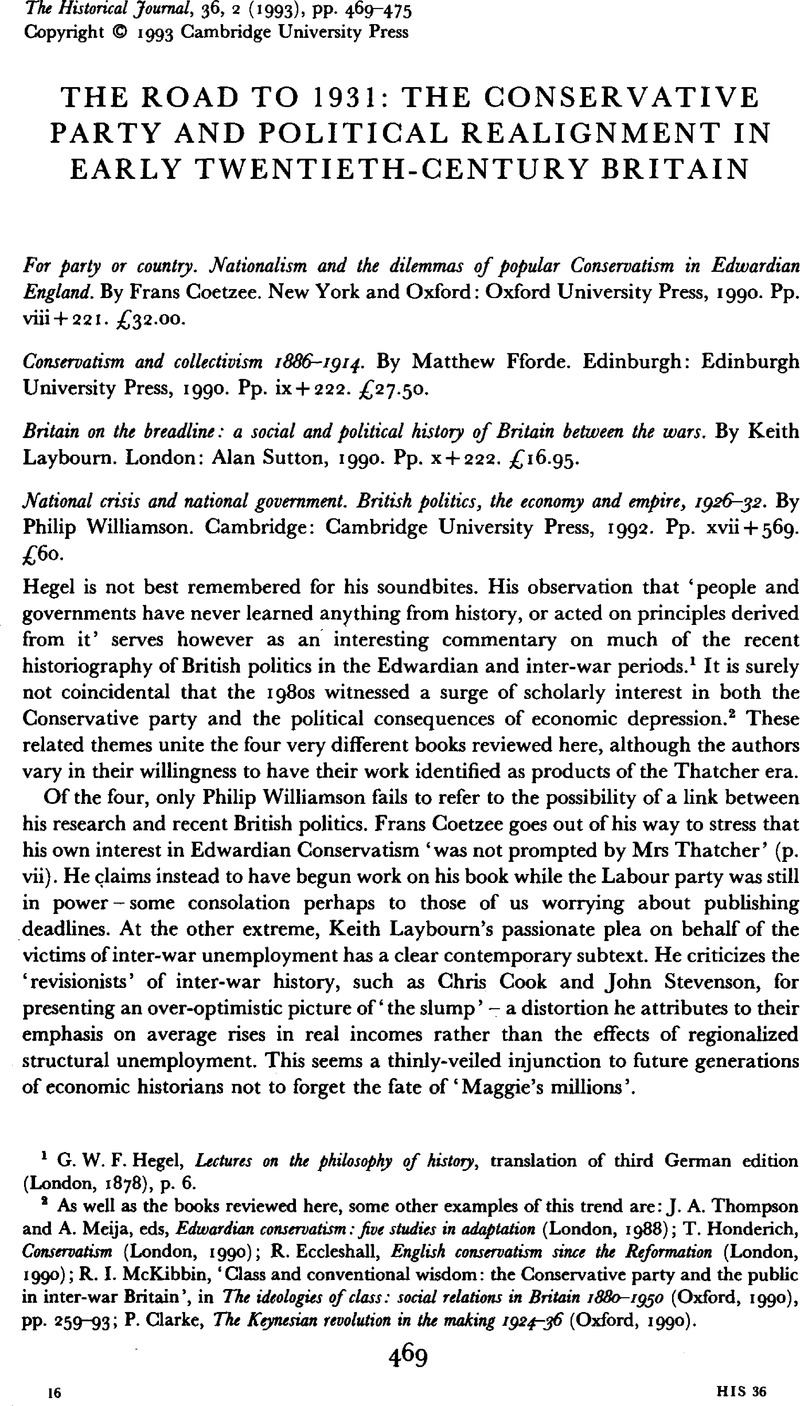No CrossRef data available.
Article contents
The road to 1931: the Conservative party and political realignment in early twentieth-century Britain
Published online by Cambridge University Press: 11 February 2009
Abstract

- Type
- Review Articles
- Information
- Copyright
- Copyright © Cambridge University Press 1993
References
1 Hegel, G. W. F., Lectures on the philosophy of history, translation of third German edition (London, 1878), p. 6Google Scholar.
2 As well as the books reviewed here, some other examples of this trend are: Thompson, J. A. and Meija, A., eds, Edwardian conservatism: five studies in adaptation (London, 1988)Google Scholar; Honderich, T., Conservatism (London, 1990)Google Scholar; Eccleshall, R., English conservatism since the Reformation (London, 1990)Google Scholar; McKibbin, R. I., ‘Class and conventional wisdom: the Conservative party and the public in inter-war Britain’, in The ideologies of class: social relations in Britain 1880–1950 (Oxford, 1990), pp. 259–93Google Scholar; Clarke, P., The Keynesian revolution in the making 1924–36 (Oxford, 1990)CrossRefGoogle Scholar.
3 For the latest overview of this literature, see Searle, G. R., The Liberal parly. Triumph and disintegration, 1886–1929 (London, 1992)Google Scholar.
4 Conservative diffidence in 1922 is discussed in Kinnear, M., The fall of Lloyd George: the political crisis of 1922 (London, 1973), pp. 53–6CrossRefGoogle Scholar.
5 The clearest statement of this position is Greenleaf, W. H., The British political tradition, vol. I, The rise of collectivism (London, 1983)Google Scholar.
6 See, for example, Sykes, A., ‘The radical Right and the crisis of Conservatism before the First World War’, Historical Journal, XXVI, 3 (1983), 662–3Google Scholar.
7 This point is also developed at some length in Ewen Green's excellent extended review article, ‘The strange death of Tory England’, Twentieth Century British History, II, I (1991), 67–88Google Scholar.
8 Joyce, P., Work, society and politics: the culture of the factory in later Victorian England (Brighton, 1982)Google Scholar.
9 For a critique of the view that patriotism proved an unmitigated benefit to the Conservative party, see Cunningham, H., ‘The Conservative party and patriotism’, in Colls, R. and Dodd, P., eds, Englishness: politics and culture 1880–1920 (London, 1986), pp. 283–307Google Scholar.
10 For details of these important changes, see for example Lewis, J., Women in England, 1870–1950 (Brighton, 1984)Google Scholar and Pugh, M., Women and the women's movement in Britain 1914–59 (London, 1992)Google Scholar.
11 These criticisms are directed primarily againstMorgan, K. O., Consensus and disunity. The Lloyd George coalition government 1918–1922 (Oxford, 1979)Google Scholar and Skidelsky, R., Politicians and the slump. The Labour government of 1929–31 (London, 1967)Google Scholar respectively.
12 Cowling, M., The impact of Labour, 1920–24 (Cambridge, 1971), p. 3Google Scholar.


